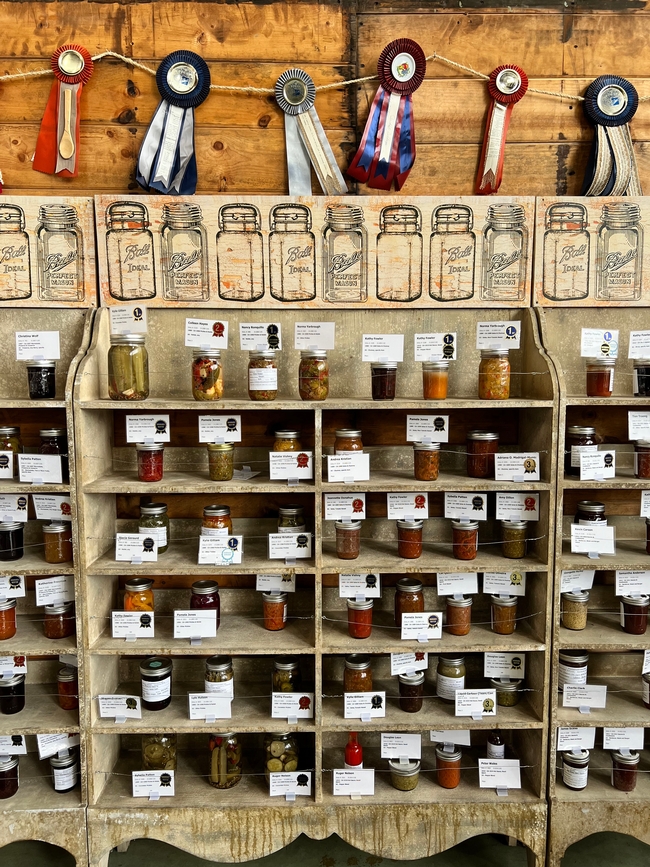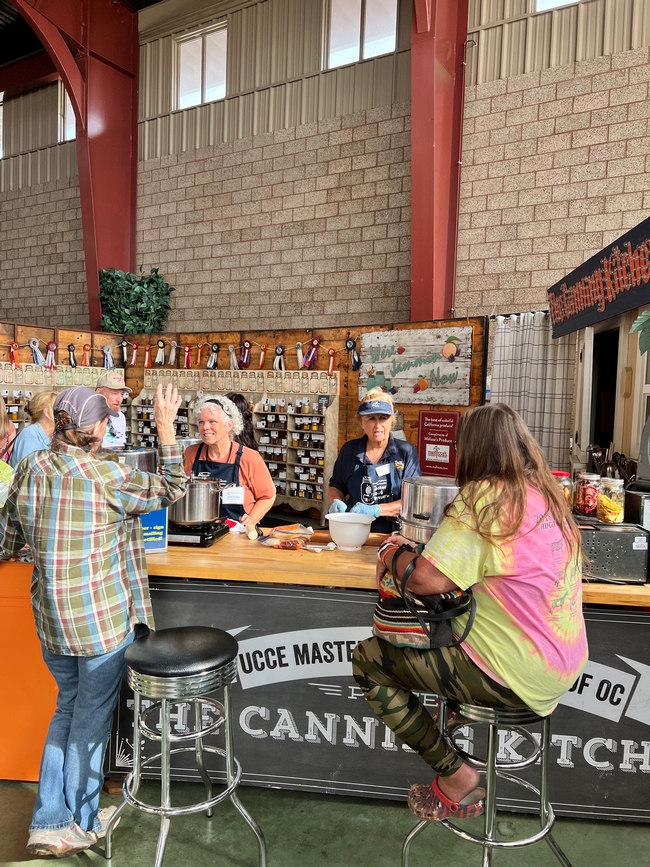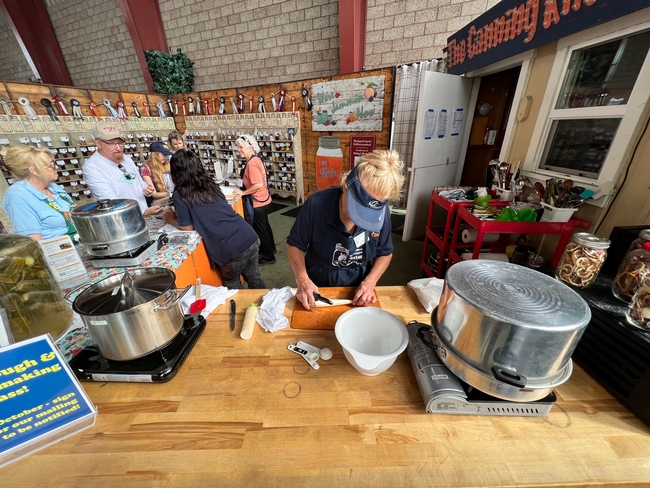More than a TikTok trend, conservation is the future of food
UC Master Food Preservers booth at the Orange County Fair in Costa Mesa, CA.
If you've visited the Orange County Fairgrounds in Costa Mesa in the past month, you may have seen the Orange County Master Food Preservers in their rustic farmhouse-themed kitchen located in the OC Promenade exhibition hall.
If the decor hadn't caught your eye, the colorful rows of glass jars lined the walls certainly would. For an entire month, three volunteers led live canning demonstrations from 11 a.m. to 8 p.m. five days a week. They are part of the UC Master Food Preserver program, a public service and outreach program under UC Agriculture and Natural Resources.
The OC Fair is the largest event hosted by UC Master Food Preserver in Orange County. Last year, UC Master Food Preservers attracted 7,000 people to their booth.

Canned Foods by UC Master Food Preservers of Orange County.
For more than 30 years, the UC Master Food Preserver program has trained hundreds of volunteers across the state to keep Californians safe by using culturally appropriate, research-based practices to preserve food at home and provide engaging ways to explore healthy foods.Food preservation has a deep history rooted in human survival. Whether freezing, drying, fermenting or pickling, preservation is a practice that has extended the life of food and humans. Other benefits include reduced food waste and improved food safety.
The latest form of preservation, called canning, was introduced in the early 1800s according to an article in the Smithsonian. By placing food in a glass jar and heating it to a certain temperature for a prescribed period of time, oxygen is removed and a vacuum is created. This process prevents the growth of unwanted bacteria, yeasts and molds, thus preventing the food from spoiling.
That's what you would have found the UC Master Food Preservers demonstrating at the OC Fair.
During her shift, Flo Vallejo, UC Master Food Preserver since 2018, carefully cut the carrots and daikon into thin slices and placed them in small mason jars with spices inspired by Vietnamese cuisine.
Between the products donated by Melissa's Produce and the various spices donated by Tampico Spice, the possibilities of what you'll see canning UC Master Food Preservers are endless.
"It's something my great-grandmother, my grandmother and my mother did. I never understood it because they didn't let little children in the kitchen," said said Alice Houseworth, first-year UC Master Food Preserver.
Many of UC's Master Food Canners have some experience in canning, whether it's a practice passed down from generation to generation or, in Houseworth's case, something they saw their elders do in their childhood.
Some might consider canning a hobby, but according to the UC Master Food Preservers, food preservation is an opportunity to prepare for economic and climate change.

UC Master Food Preservers Alice Houseworth and Flo Vallejo attract visitors.
Esa Kiefer, another UC Master Food Preserver since 2018, expressed concern over rising food prices and declining arable land. "I feel like now is the time to prepare for these changing times," she said. "Who knows what the future of food will look like?"
Maybe the future of food will come from glass jars.
"You can even can chicken," Houseworth said. "When it's cheap at the grocery store, you can buy it and use the pr...


UC Master Food Preservers booth at the Orange County Fair in Costa Mesa, CA.
If you've visited the Orange County Fairgrounds in Costa Mesa in the past month, you may have seen the Orange County Master Food Preservers in their rustic farmhouse-themed kitchen located in the OC Promenade exhibition hall.
If the decor hadn't caught your eye, the colorful rows of glass jars lined the walls certainly would. For an entire month, three volunteers led live canning demonstrations from 11 a.m. to 8 p.m. five days a week. They are part of the UC Master Food Preserver program, a public service and outreach program under UC Agriculture and Natural Resources.
The OC Fair is the largest event hosted by UC Master Food Preserver in Orange County. Last year, UC Master Food Preservers attracted 7,000 people to their booth.

Canned Foods by UC Master Food Preservers of Orange County.
For more than 30 years, the UC Master Food Preserver program has trained hundreds of volunteers across the state to keep Californians safe by using culturally appropriate, research-based practices to preserve food at home and provide engaging ways to explore healthy foods.Food preservation has a deep history rooted in human survival. Whether freezing, drying, fermenting or pickling, preservation is a practice that has extended the life of food and humans. Other benefits include reduced food waste and improved food safety.
The latest form of preservation, called canning, was introduced in the early 1800s according to an article in the Smithsonian. By placing food in a glass jar and heating it to a certain temperature for a prescribed period of time, oxygen is removed and a vacuum is created. This process prevents the growth of unwanted bacteria, yeasts and molds, thus preventing the food from spoiling.
That's what you would have found the UC Master Food Preservers demonstrating at the OC Fair.
During her shift, Flo Vallejo, UC Master Food Preserver since 2018, carefully cut the carrots and daikon into thin slices and placed them in small mason jars with spices inspired by Vietnamese cuisine.
Between the products donated by Melissa's Produce and the various spices donated by Tampico Spice, the possibilities of what you'll see canning UC Master Food Preservers are endless.
"It's something my great-grandmother, my grandmother and my mother did. I never understood it because they didn't let little children in the kitchen," said said Alice Houseworth, first-year UC Master Food Preserver.
Many of UC's Master Food Canners have some experience in canning, whether it's a practice passed down from generation to generation or, in Houseworth's case, something they saw their elders do in their childhood.
Some might consider canning a hobby, but according to the UC Master Food Preservers, food preservation is an opportunity to prepare for economic and climate change.

UC Master Food Preservers Alice Houseworth and Flo Vallejo attract visitors.
Esa Kiefer, another UC Master Food Preserver since 2018, expressed concern over rising food prices and declining arable land. "I feel like now is the time to prepare for these changing times," she said. "Who knows what the future of food will look like?"
Maybe the future of food will come from glass jars.
"You can even can chicken," Houseworth said. "When it's cheap at the grocery store, you can buy it and use the pr...
What's Your Reaction?












![Three of ID's top PR executives quit ad firm Powerhouse [EXCLUSIVE]](https://variety.com/wp-content/uploads/2023/02/ID-PR-Logo.jpg?#)







